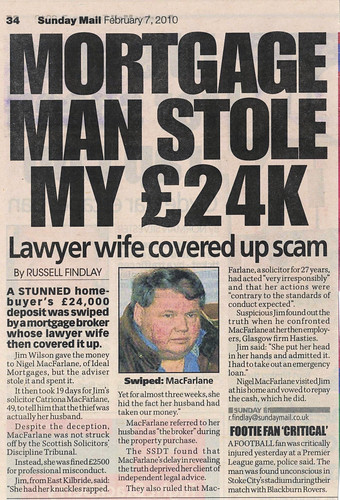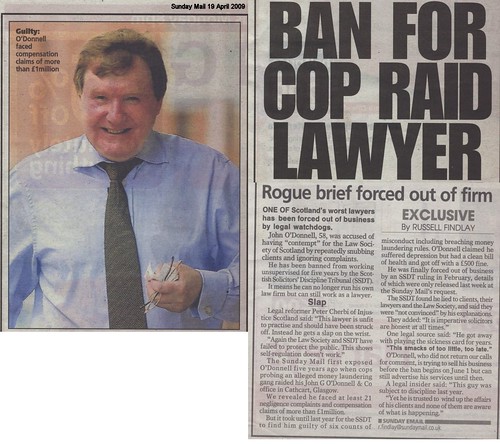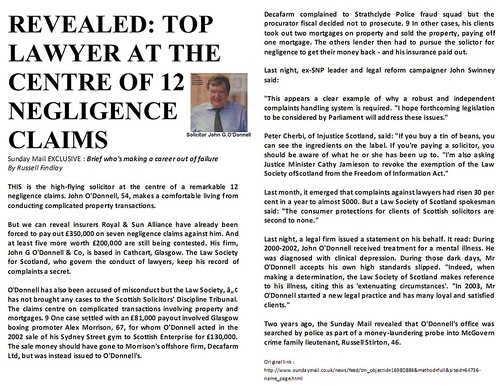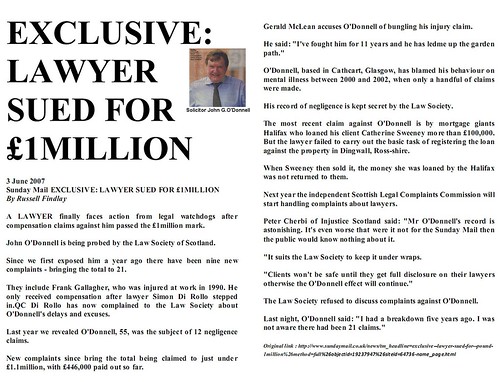The latest Scottish Legal Consumer Complaints alert names Solicitor Andrew ‘Drew’ P. Penman of Stormonth Darling Solicitors, 5 The Square, Kelso, Scottish Borders who was to be prosecuted for his offences against clients, banks, the Inland Revenue and even the Law Society’s own investigator, who had to cope with file evidence which had been altered by Mr Penman & Stormonth Darling to defeat the ends of the investigation.
The Law Society investigating reporter said in his report : “The reporter was of the view that the substantial and unnecessary delays which had taken place in the executry might amount not only to an inadequate professional service on the part of Messrs. P.& J. Stormonth Darling but professional misconduct on the part of Mr Penman the solicitor dealing with the matter up until the time the complaint was lodged with the Law Society on 17th October 1994. Further the reporter was of the view that the apparent deliberate attempt to mislead the Royal Bank in regard to the Banco di Roma account may amount to professional misconduct.”
“The Committee concurred with the views of the reporter in this matter indicating that the apparent attempt to mislead the Royal Bank persuaded them that Mr Penman's acting in the matter were so serious and reprehensible as to amount to professional misconduct.”
“The reporter noted there was also evidence of what appeared to be a bungled and unsuccessful attempt to put the file into order. Correspondence of July 1990 and July 1991 had been put on the file at a point which clearly related to July 1992.“
This is what awaits potential clients of Stormonth Darling Solicitors, Kelso & Solicitor Andrew Penman :
Read all about Andrew ‘Drew’ Penman’s conduct for yourself in the following Law Society of Scotland investigation report .. then consider whether you want someone like Mr Penman representing your legal interests :
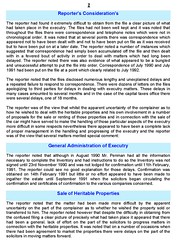 Law Society investigating lawyer found that Andrew Penman had tried to fake the files. The Law Society report said : “The reporter had found it extremely difficult to obtain from the file a clear picture of what had taken place in the executry. The files had not been well kept and it was noted that throughout the files there were correspondence and telephone notes which were not in chronological order. It was noted that at several points there was correspondence which appeared not to have been dealt with and not to have been put on file as it was received but to have been put on at a later date. The reporter noted a number of' instances which suggested that correspondence had simply been accumulated off the file and then dealt with in a fevered bout of activity in order to deal with matters which had long been delayed. The reporter noted there was also evidence of what appeared to be a bungled and unsuccessful attempt to put the file into order. Correspondence of July 1990 and July 1991 had been put on the file at a point which clearly related to July 1992.“
Law Society investigating lawyer found that Andrew Penman had tried to fake the files. The Law Society report said : “The reporter had found it extremely difficult to obtain from the file a clear picture of what had taken place in the executry. The files had not been well kept and it was noted that throughout the files there were correspondence and telephone notes which were not in chronological order. It was noted that at several points there was correspondence which appeared not to have been dealt with and not to have been put on file as it was received but to have been put on at a later date. The reporter noted a number of' instances which suggested that correspondence had simply been accumulated off the file and then dealt with in a fevered bout of activity in order to deal with matters which had long been delayed. The reporter noted there was also evidence of what appeared to be a bungled and unsuccessful attempt to put the file into order. Correspondence of July 1990 and July 1991 had been put on the file at a point which clearly related to July 1992.“
“The reporter noted that the files disclosed numerous lengthy and unexplained delays and a repeated failure to respond to correspondence. There were dozens of letters on the files apologizing to third parties for delays in dealing with executry matters. These delays in many cases amounted to several months and in the case of the capital taxes office there were several delays, one of 18 months.”
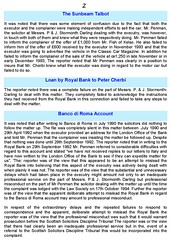 Law Society investigating lawyer found Andrew Penman deliberately mislead the Royal Bank of Scotland, amounting to professional misconduct. Page two of the Law Society report said : “The reporter noted there was a complete failure on the part of Messrs. P. & J. Stormonth-Darling to deal with this matter. They completely failed to acknowledge the instructions they had received from the Royal Bank in this connection and failed to take any steps to deal with the matter. The reporter was of the view that the substantial and unnecessary delays which had taken place in the executry might amount not only to an inadequate professional service on the part of Messrs. P.& J. Stormonth Darling but professional misconduct on the part of Mr Penman the solicitor dealing with the matter up until the time the complaint was lodged with the Law Society on 17th October 1994. Further the reporter was of the view that the apparent deliberate attempt to mislead the Royal Bank in regard to the Banco di Roma account may amount to professional misconduct.”
Law Society investigating lawyer found Andrew Penman deliberately mislead the Royal Bank of Scotland, amounting to professional misconduct. Page two of the Law Society report said : “The reporter noted there was a complete failure on the part of Messrs. P. & J. Stormonth-Darling to deal with this matter. They completely failed to acknowledge the instructions they had received from the Royal Bank in this connection and failed to take any steps to deal with the matter. The reporter was of the view that the substantial and unnecessary delays which had taken place in the executry might amount not only to an inadequate professional service on the part of Messrs. P.& J. Stormonth Darling but professional misconduct on the part of Mr Penman the solicitor dealing with the matter up until the time the complaint was lodged with the Law Society on 17th October 1994. Further the reporter was of the view that the apparent deliberate attempt to mislead the Royal Bank in regard to the Banco di Roma account may amount to professional misconduct.”
The Law Society investigating lawyer went onto demand a prosecution of Andrew Penman, saying : “In respect of the extraordinary delays and the repeated failures to respond to correspondence and the apparent, deliberate attempt to mislead the Royal Bank the reporter was of the view that the professional misconduct was such that it would warrant prosecution before the Scottish Solicitors Discipline Tribunal The reporter was or the view that there had clearly been an inadequate professional service but in the, event of a referral to the Scottish Solicitors Discipline Tribunal this would be incorporated into the complaint.”
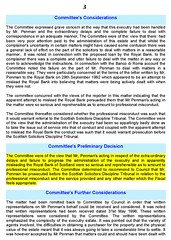 Law Society Complaints Committee said Andrew Penman mislead the Royal Bank, was a failure at handling an executry. The Committee’s consideration of the investigating lawyer’s findings revealed : “The Committee expressed grave concern at the way that this executry had been handled by Mr. Penman and the extraordinary delays and the complete failure to deal with correspondence in an adequate manner, The Committee were of the: view that there: had been very poor attention paid to the administration of this estate and that whilst the complainer's uncertainty in certain matters might have caused some confusion there was a general lack of effort on the part of the solicitors to deal with matters in a reasonable manner.. It was noted in connection with the proposed loan by the Royal Bank. to the complainer there was a complete and utter failure to deal with the matter in any way or even to acknowledge the instructions. In connection with the Banco di Roma account the Committee noted the failure on the part of Mr. Penman to deal with matters in a reasonable way. They were particularly concerned at the terms of the letter written by Mr. Penman to the Royal Bank on 29th September 1992 which appeared to be an attempt to mislead the Royal Bank into believing that matters were being actively dealt with when they were not.”
Law Society Complaints Committee said Andrew Penman mislead the Royal Bank, was a failure at handling an executry. The Committee’s consideration of the investigating lawyer’s findings revealed : “The Committee expressed grave concern at the way that this executry had been handled by Mr. Penman and the extraordinary delays and the complete failure to deal with correspondence in an adequate manner, The Committee were of the: view that there: had been very poor attention paid to the administration of this estate and that whilst the complainer's uncertainty in certain matters might have caused some confusion there was a general lack of effort on the part of the solicitors to deal with matters in a reasonable manner.. It was noted in connection with the proposed loan by the Royal Bank. to the complainer there was a complete and utter failure to deal with the matter in any way or even to acknowledge the instructions. In connection with the Banco di Roma account the Committee noted the failure on the part of Mr. Penman to deal with matters in a reasonable way. They were particularly concerned at the terms of the letter written by Mr. Penman to the Royal Bank on 29th September 1992 which appeared to be an attempt to mislead the Royal Bank into believing that matters were being actively dealt with when they were not.”
“The Committee concurred with the views of the reporter in this matter indicating that the apparent attempt to mislead the Royal Bank persuaded them that Mr Penman's acting in the matter were so serious and reprehensible as to amount to professional misconduct.”
“The Committee thereafter considered whether the professional misconduct was such that it would warrant referral to the Scottish Solicitors Discipline Tribunal. The Committee were of the view that the administration of the executry had been so appallingly badly done as to take the issue out of service into that of conduct and coupled with the apparent attempt to mislead the Royal Bank the conduct was such that it would warrant prosecution before the Scottish Solicitors Discipline Tribunal. “
Law Society Complaints Committee decided that Andrew Penman should be prosecuted : “The Committee were of the view that Mr, Penman's acting in respect of the extra-ordinary delays and failure to progress the administration of the executry and in apparently misleading the Royal Bank of Scotland were so serious and reprehensible as to amount to professional misconduct. The Committee determined to recommend to Council that Mr. Penman be prosecuted before the Scottish Solicitors Discipline Tribunal in relation to the professional misconduct and the service provided and any other matter which the Fiscal feels appropriate.”
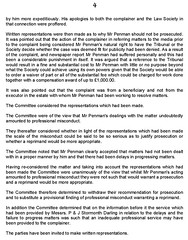 Andrew Penman told the Complaints Committee not to prosecute him, citing personal humiliation in the media as an excuse, while his legal representative at the Committee, Mr James Ness used his influence among the Committee members to derail the decision to prosecute Mr Penman, as the report further revealed : “Written representations were then made as to why Mr Penman should not be prosecuted. It was pointed out that the action of the complainer in referring matters to the media prior to the complaint being considered Mr Penman's natural right to have the Tribunal or the Society decide whether the case was deemed fit for publicity had been denied. As a result of the complaint, and newspaper report Mr Penman had suffered personally and this had been a considerable punishment in itself. It was argued that a reference to the Tribunal would result in a fine and substantial cost to Mr Penman with little or no purpose beyond what the Society could achieve using its own powers given that the Society would be able to order a waiver of part or all of the substantial fee which could be charged for work done together with a compensation award of up to £1,000.00.”
Andrew Penman told the Complaints Committee not to prosecute him, citing personal humiliation in the media as an excuse, while his legal representative at the Committee, Mr James Ness used his influence among the Committee members to derail the decision to prosecute Mr Penman, as the report further revealed : “Written representations were then made as to why Mr Penman should not be prosecuted. It was pointed out that the action of the complainer in referring matters to the media prior to the complaint being considered Mr Penman's natural right to have the Tribunal or the Society decide whether the case was deemed fit for publicity had been denied. As a result of the complaint, and newspaper report Mr Penman had suffered personally and this had been a considerable punishment in itself. It was argued that a reference to the Tribunal would result in a fine and substantial cost to Mr Penman with little or no purpose beyond what the Society could achieve using its own powers given that the Society would be able to order a waiver of part or all of the substantial fee which could be charged for work done together with a compensation award of up to £1,000.00.”
 Law Society senior lawyer James Ness got Penman off the hook at the Complaints Committee by providing false evidence. A variety of further excuses were presented by Andrew Penman, through his legal agent Mr Ness, which persuaded the Committee not to prosecute, : “It was also pointed out that the complaint was from a beneficiary and not from the executor in the estate with whom Mr Penman had been working to resolve matters. The Committee considered the representations which had been made. The Committee were of the view that Mr Penman's dealings with the matter undoubtedly amounted to professional misconduct. They thereafter considered whether in light of the representations which had been made the scale of the misconduct could be said to be so serious as to justify prosecution or whether a reprimand would be more appropriate. The Committee noted that Mr Penman clearly accepted that matters had not been dealt with in a proper manner by him and that there had been delays in progressing matters.”
Law Society senior lawyer James Ness got Penman off the hook at the Complaints Committee by providing false evidence. A variety of further excuses were presented by Andrew Penman, through his legal agent Mr Ness, which persuaded the Committee not to prosecute, : “It was also pointed out that the complaint was from a beneficiary and not from the executor in the estate with whom Mr Penman had been working to resolve matters. The Committee considered the representations which had been made. The Committee were of the view that Mr Penman's dealings with the matter undoubtedly amounted to professional misconduct. They thereafter considered whether in light of the representations which had been made the scale of the misconduct could be said to be so serious as to justify prosecution or whether a reprimand would be more appropriate. The Committee noted that Mr Penman clearly accepted that matters had not been dealt with in a proper manner by him and that there had been delays in progressing matters.”
The Complaints Committee, arm-twisted by Penman’s representative, James Ness, and lacking any equivalent representation for my points, then changed their verdict to save Mr Penman so he could ruin some more unsuspecting clients : “Having re-considered the matter and taking into account the representations which had been made the Committee were unanimously of the view that whilst Mr Penman's acting amounted to professional misconduct they were not such that would warrant a prosecution and a reprimand would be more appropriate. The Committee therefore determined to withdraw their recommendation for prosecution and to substitute a provisional finding of professional misconduct warranting a reprimand.”
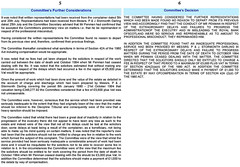 Complaints Committee accused Andrew Penman of Professional Misconduct, and did nothing after Law Society intervention. The Complaints Committee in the lead up to their decision, began to excuse their change of mind over prosecution, stating : “It was noted that written representations had been received from the complainer dated 5th and 20th July. Representations had been received from Messrs. P & J Stormonth Darling dated 25th July and the Committee Secretary advised that Mr Penman had confirmed that he accepted the Committee's preliminary view on matters i.e. that he be reprimanded in respect of the professional misconduct. Having considered the written representations the Committee found no reason to depart from its previous view and, therefore, confirmed their previous findings.”
Complaints Committee accused Andrew Penman of Professional Misconduct, and did nothing after Law Society intervention. The Complaints Committee in the lead up to their decision, began to excuse their change of mind over prosecution, stating : “It was noted that written representations had been received from the complainer dated 5th and 20th July. Representations had been received from Messrs. P & J Stormonth Darling dated 25th July and the Committee Secretary advised that Mr Penman had confirmed that he accepted the Committee's preliminary view on matters i.e. that he be reprimanded in respect of the professional misconduct. Having considered the written representations the Committee found no reason to depart from its previous view and, therefore, confirmed their previous findings.”
Would you do business with Stormonth Darling after reading this ?


